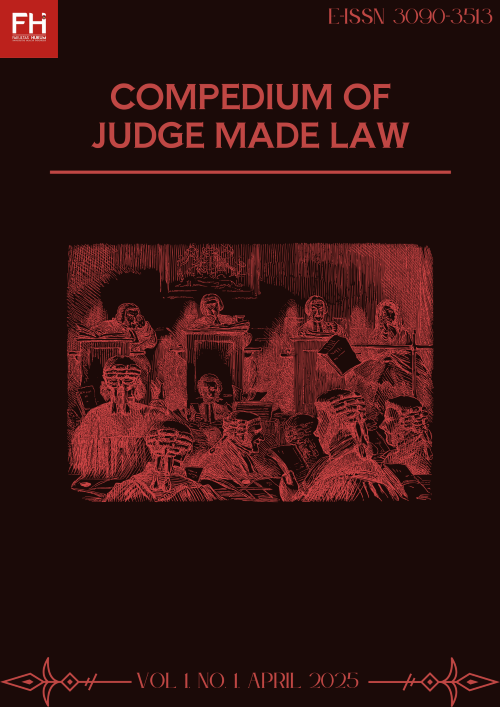Distribution of Inheritance According to Mawaris Islamic Jurisprudence Law in the Compilation of Islamic Law
DOI:
https://doi.org/10.56087/e0dh8z82Keywords:
Inheritance;, Islamic Law; , Compilation of Islamic Law;Abstract
Abstract:
The application of the reverse burden of proof in gratification cases within corruption offenses is a pivotal legal instrument in Indonesia’s anti-corruption strategy, yet its effectiveness remains subject to both theoretical debate and practical challenges. While this mechanism normatively grants defendants the opportunity to prove that the gratification received is unrelated to their official position, there is a notable research gap in examining how judicial reasoning determines the success or failure of such proof in court proceedings. This study employs a normative juridical method with a case study approach, focusing on court decisions that implement the reverse burden of proof. The analysis centers on the construction of judicial arguments in assessing the evidence and statements presented by the defendant. The findings reveal that the defendant failed to convince the panel of judges that the gratification in question was beyond the scope of their authority, highlighting the substantial evidentiary burden borne by defendants. These results underscore the necessity for a comprehensive understanding of both substantive and procedural legal aspects in reverse proof mechanisms, while contributing to the broader discourse on the development of criminal procedural law in corruption cases in Indonesia.
References
[1] A. Saiin, “Menelaah Hukum Waris Pra-Islam Dan Awal Islam Serta Peletakan Dasar-Dasar Hukum Kewarisan Islam,” Al-Ahwal J. Huk. Kel. Islam, vol. 9, no. 1, p. 125, 2017, doi: 10.14421/ahwal.2016.09108.
[2] C. A. Millenia and A. C. Cindrapole, “ISLAMIC LEGAL ANALYSIS ON SUSPECTS,” pp. 1–12, 1945.
[3] A. Zainuddin, “Perbandingan Hibah Menurut Hukum Perdata dan Hukum Islam,” J. Al-Himayah, vol. 1, no. 1, pp. 92–105, 2017, [Online]. Available: https://journal.iaingorontalo.ac.id/index.php/ah/article/view/288
[4] M. S. Ummah, “Hukum Perdata Islam,” Sustain., vol. 11, no. 1, pp. 1–14, 2019, [Online]. Available: http://scioteca.caf.com/bitstream/handle/123456789/1091/RED2017-Eng-8ene.pdf?sequence=12&isAllowed=y%0Ahttp://dx.doi.org/10.1016/j.regsciurbeco.2008.06.005%0Ahttps://www.researchgate.net/publication/305320484_SISTEM_PEMBETUNGAN_TERPUSAT_STRATEGI_MELESTARI
[5] H. Kusmayanti, “HAK DAN KEDUDUKAN CUCU SEBAGAI AHLI WARIS PENGGANTI DALAM SISTEM PEMBAGIAN WARIS DITINJAU DARI HUKUM WARIS ISLAM DAN KOMPILASI HUKUM ISLAM,” vol. 19, no. 1, pp. 68–85, 2019.
[6] Siti Maryam, F. Rahman, and I. Sagala, “Analisis Terhadap Putusan Mahkamah Agung No. 368 K/Ag/1995 Tentang Hak Menerima Wasiat Wajibah Dalam Perspektif Hukum Islam,” J. Compr. Islam. Stud., vol. 1, no. 2, pp. 221–242, 2022, doi: 10.56436/jocis.v1i2.93.
[7] Santoso, “Hakekat Perkawinan Menurut Undang-Undang Perkawinan, Hukum Islam dan Hukum Adat,” J. YUDISIA, vol. 7, no. 2, p. 412, 2016.
[8] S. Maymuna, “Perlindungan Hukum Terhadap Anak Hasil Dari Nikah Siri Perspektif Hukum Islam Dan Hukum Positif,” Grad. J. Mhs., vol. 1, no. 1, pp. 7–14, 2024.
[9] Subkhi Mahmasani, “KEDUDUKAN HIBAH WASIAT MENURUT HUKUM ISLAM DAN HUKUM PERDATA,” pp. 274–282, 2020.
[10] S. Senen and A. Kelib, “Implementasi Bagian Wasiat Harta Waris Anak Angkat Dalam Kajian Kompilasi Hukum Islam (KHI),” J. Usm Law Rev., vol. 2, no. 1, p. 52, 2019, doi: 10.26623/julr.v2i1.2258.
[11] M. Husni, A. Pakarti, and D. Farid, “Perlindungan Hak Anak Dalam Perceraian Menurut Hukum keluarga Islam,” J. Huk. Kel., vol. 7, pp. 14–36, 2023.
[12] M. H. . Dr. Siti Nurjanah, M.Ag Dr. Agus Hermanto and ISBN, Hukum Perkawinan Islam Progresif Di Indonesia. 2016.
[13] A. PRATIWI, “Tinjauan Hukum Islam Terhadap Tradisi Piduduk Dalam Pernikahan Adat Banjar Di Kelurahan Tembilahan Hilir Kabupaten Indragiri Hilir,” 2023.
[14] H. A. Khisni, TRANSFORMASI HUKUM ISLAM KE DALAM HUKUM NASIONAL (Studi Ijtihad Hakim Peradilan Agama tentang Pengembangan Hukum Kewarisan dalam Kompilasi Hukum Islam dan Kontribusinya terhadap Hukum Nasional). 2011. [Online]. Available: https://research.unissula.ac.id/file/publikasi/210389017/8759Tranformasi_Hkm_Islam_ke_dlm_hk_nasional.pdf
[15] I. A. A. I. Yuliandari, I. K. Sukadana, and D. G. Sudibya, “Kedudukan Cucu Sebagai Ahli Waris Pengganti Dalam Hukum Waris Islam (Studi Kasus Nomor: 0013/PDT.P/2015/PA.DPS),” J. Analog. Huk., vol. 2, no. 3, pp. 346–350, 2020, doi: 10.22225/ah.2.3.2520.346-350.
Downloads
Published
Issue
Section
License
Copyright (c) 2025 Muhammad Adam Surya Raya, Salmawati Salmawati, Mursyid Mursyid

This work is licensed under a Creative Commons Attribution-ShareAlike 4.0 International License.


